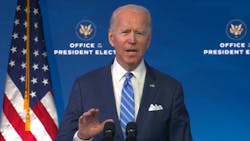Biden’s American Rescue Plan includes $20 billion for transit industry
On Thursday, President-elect Joe Biden outlined his two-step proposal to rescue the nation “from the depths” of the COVID-19 health crisis and recover “by investing in America.”
The first step has been titled the “American Rescue Plan” and is designed to mount a national vaccination program, reopen schools, deliver emergency relief to those impacted by the crisis and support communities. The second step of the proposal, the “Build Back Better Recovery Plan,” will be laid out next month and will include investments in infrastructure.
"Our rescue and recovery plan is the path forward with a seriousness of purpose, a clear plan with transparency and accountability with a call for unity that is equally necessary," President-elect Biden said during a speech Jan. 14 outlining the plan.
As part of the $1.9 trillion American Rescue Plan, the incoming administration is proposing $20 billion in relief to “the hardest hit public transit agencies.” No further information was available on what the definition of “hardest hit” means or how the funds would be divided among the transit agencies.
“Safe and dependable public transit systems are critical for a robust and equitable economy recovery,” the incoming administration wrote in a fact sheet on the plan. “This relief will keep agencies from laying off transit workers and cutting the routes that essential workers rely on every day while making these transit systems more resilient and ensuring that communities of color maintain the access to opportunity that public transportation provides.”
In March 2020, the Coronavirus Aid, Relief and Economic Security (CARES) Act provided the transit industry with $25 billion, followed by the Coronavirus Response and Relief Supplemental Appropriations Act of 2021 that provided the industry with an additional $14 billion in emergency funding relief. Industry stakeholders and transit agencies had been advocating for at least an additional $32 billion after the CARES Act, which the second relief bill fell short of. Despite the $39 billion in emergency relief, transit agencies still face compounding budget deficits brought about by the pandemic.
New York Metropolitan Transportation Authority (MTA) Chairman and CEO Patrick Foye called the American Rescue Plan a “strong start.”
“It’s clear the new administration believes in transit and understands that these investments will jumpstart our economic recovery. Because without a robust MTA powering New York’s revival, there can be no national rebound,” said Foye.
Reactions to the recovery proposal from transit industry advocates were also positive.
American Public Transportation Association (APTA) President and CEO Paul Skoutelas called the funding proposed in the plan “vital to the industry’s survival” and explained it would prevent “massive labor cuts and drastic service reductions.”
“Public transportation has served an essential role during this pandemic and is an indispensable part of the social and economic recovery of our communities and our country. Despite the tremendous challenges the public transit industry faces, we continue to provide millions of Americans the ability to get to work, school, grocery stores and healthcare appointments,” added Skoutelas. “Investment in public transit is a bipartisan issue, and APTA will continue to work with Democrats and Republicans alike in Congress to build a public transportation infrastructure that is the pride of the nation and helps our communities and our nation recover from the severe economic fallout of the pandemic.”
U.S. Public Interest Research Group Environment Campaigns Director Matt Casale expressed gratitude toward the proposed financial transit relief and the recognition of the important role of public transportation.
“This investment will be critical in ensuring that agencies across the country are able to overcome the challenges posed by the pandemic without decimating service,” said Casale. “Once we emerge from the pandemic, we look forward to working with the Biden administration and Congress to provide long-term, sustainable investment in public transportation. This is necessary to allow our transit agencies to not only be more resilient during crises, but also to expand access and modernize services.”

Mischa Wanek-Libman | Group Editorial Director
Mischa Wanek-Libman is director of communications with Transdev North America. She has more than 20 years of experience working in the transportation industry covering construction projects, engineering challenges, transit and rail operations and best practices.
Wanek-Libman has held top editorial positions at freight rail and public transportation business-to-business publications including as editor-in-chief and editorial director of Mass Transit from 2018-2024. She has been recognized for editorial excellence through her individual work, as well as for collaborative content.
She is an active member of the American Public Transportation Association's Marketing and Communications Committee and served 14 years as a Board Observer on the National Railroad Construction and Maintenance Association (NRC) Board of Directors.
She is a graduate of Drake University in Des Moines, Iowa, where she earned a Bachelor of Arts degree in Journalism and Mass Communication.


